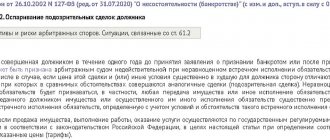If wishing to challenge a gift transaction, a citizen must first clarify the statute of limitations for it. The law sets clear time frames. If time is lost, you can restore it by filing an appropriate petition. The court will grant the request if the plaintiff has a good reason. The statute of limitations for a gift agreement is standard, but it is worth understanding the nuances of the procedure to determine whether the period varies depending on the type of property.
General limitation period for donation
A voidable transaction is a type of invalid agreement other than those recognized by law as void.
The court carries out the procedure; only it has the right to make such a decision based on the evidence provided by the parties.
Donation is a simple procedure. As soon as the parties sign the agreement, the donor transfers the property to the donee, and he registers his rights as an owner in Rosreestr. As soon as the new agreement is registered, there is a possibility of challenging it in court.
Learn important things: Registration of rights to real estate: procedure
Sometimes citizens initiate the process after a long time. According to the provisions of Article 195 of the Civil Code of the Russian Federation , the limitation period is the time given to a person to protect his violated rights.
The plaintiff's claims arise when:
· from the donor - decided to cancel the agreement and return the transferred property;
· from the donee – demand the promised;
· creditors and pledgees – the gift transferred to the recipient was previously subject to foreclosure;
· heirs of the donor – return the property of the deceased.
Legally, the transaction is considered voidable, although it is difficult to fulfill. After all, both parties were sane when signing the agreement and knew the consequences of their decisions.
The statute of limitations established by law is short, 1-3 years , depending on the wording of the claim.
Break and suspension of the limitation period
During the limitation period, persons who have the right to challenge invalid transactions may encounter circumstances that prevent them from filing a claim in court. If such circumstances are recognized by the court as valid, then the limitation period is suspended for the duration of their existence. Such cases are defined in paragraph 1 of Art. 202 Civil Code of the Russian Federation:
- the occurrence of an emergency or unpreventable situation that prevents the plaintiff from filing an application on time;
- the plaintiff or defendant served in the ranks of the Armed Forces of the Russian Federation under martial law;
- deferment by law of fulfillment of obligations;
- suspension of legislative acts that regulate legal relations.
There are also other grounds for suspending the limitation period. For example, Art. 204 of the Civil Code of the Russian Federation provides for such a possibility when going to court to protect one’s violated rights. The time limit is suspended for the entire duration of the trial from the moment the plaintiff applies to the court . If the court left the claim without consideration, then the limitation period continues to run. This does not apply to claims brought in a criminal case.
A mandatory condition for suspending the limitation period is the operation of the above circumstances in the last six months before the expiration of the established claim period (Clause 2 of Article 202 of the Civil Code of the Russian Federation). After the termination of the circumstances, the duration of the period is extended to six months, if the remaining part of it is less than six months.
This is important to know: Limitation period for writ of execution
The limitation period may also be interrupted . Unlike the suspension of a period, its interruption is associated with the actions of the plaintiff or defendant. In accordance with Art. 203 of the Civil Code, the grounds for interrupting the limitation period are:
- filing a claim - a statement of claim must be filed with the judicial body that has jurisdiction over the case, in the manner prescribed by law, in compliance with the form and content, paying the state fee, attaching the necessary additional documents, evidence, etc.;
- the defendant commits actions that will indicate his recognition of the claim - for example, partial payment of the debt or a request for its deferment, a statement by the defendant agreeing with the plaintiff’s demands.
These actions must be completed before the expiration of the statute of limitations established for challenging the transaction. The break time is not counted , and the calculation of the limitation period begins anew after the break.
Apartments
Often this type of real estate becomes a “bone of contention” between the parties. According to the law, the owner has the right to give the property to anyone, even a stranger. Relatives who consider themselves legal heirs are opposed.
The general statute of limitations for such procedures is:
- 3 years is a general rule that applies to all void transactions;
- 1 year – voidable transactions or recognized as such through the court.
Expert opinion
Nina Matveeva, real estate consultant
If you miss this time, you will have to restore it. Here it is important for the plaintiff to provide compelling arguments for his delay. This is established by the Civil Code, and the parties cannot change the time privately. Any agreement between them will be illegal.
The limitation period for a gift agreement
According to Part 2 of Art. 181 of the Civil Code of the Russian Federation, the limitation period for a claim to recognize a voidable transaction as invalid and to apply the consequences of its invalidity is one year.
Limitation period:
- 3 years (as a general rule and for void transactions);
- 1 year (for voidable transactions that are recognized as such in court).
The legislator has established such limited terms so that the plaintiff (the one whose rights are violated) can figure out whether his rights have been violated , if so, how, and at the same time, evidence will not be lost in such a short time. The loss of evidence can affect the “quality” of justice, leading to an unfounded court decision regarding the dispute.
This is important to know: Claim for eviction from a municipal apartment: sample
The limitation period may be suspended in exceptional cases (specified in civil law):
- if there is an emergency, insurmountable situation;
- one of the parties serves in the Armed Forces of the Russian Federation, when martial law is declared;
- such suspension is legally enshrined;
- The Civil Code of the Russian Federation has been suspended.
Shares in the apartment
You can donate not all, but part of the property. The main thing is the status of the owner. If he is the owner, he has freedom of action. The statute of limitations for challenging such agreements is one – 3 years . However, other circumstances may arise. For example, the gift involved cash and the transfer of cash was documented.
There will be some nuances:
· the statute of limitations for challenging a transaction will remain unchanged;
· the procedure may change, then the time will increase;
· the agreement is canceled upon receipt of cash in exchange for a completed deed of gift;
· if the donor takes money in exchange for the property being given away, the agreement can be officially recognized as a purchase and sale.
Find out important things: Donating a share in an apartment - how it happens
By law, money should not appear in such procedures. The recipient of the property takes the property for free. And he bears no reciprocal obligations. Otherwise, the donation will be cancelled.
Is it possible to suspend and interrupt the statute of limitations?
The limitation period can be suspended if:
- An obstacle has arisen in the form of force majeure (emergency).
- The plaintiff or defendant serves in the military.
- The matter was postponed.
- The legal effect of regulations has been suspended.
If the parties to the contract decide to conduct proceedings outside the court using mediation or mediation, the period is calculated by the law on the rules for conducting these procedures. If it is not installed, then 6 months are counted from the date on which this procedure began.
The grounds for suspension of the term are:
- the plaintiff filed a lawsuit to challenge the transaction;
- the defendant admits the claim or makes a partial payment or asks the court to postpone the case.
Shares in LLC
A citizen has the right to donate only the paid-up portion of the authorized capital (his share of the LLC). Moreover, the charter must contain the conditions under which the procedure will take place. And the consent of other members of society.
The deal is declared invalid in court. The authorized person writes a claim to the arbitration court:
- the donor or his representative;
- a person whose rights were violated after the conclusion of the agreement (for example, an heir);
- a prosecutor representing the interests of the donor.
The plaintiff needs to prove his case. According to the provisions of Article 181 of the Civil Code of the Russian Federation, the time limit for all voidable transactions is 1 year, and void transactions are 3 years. The opportunity to initiate a case remains even after the expiration of this period. The concept of “limitation period” will be used if one party declares this in advance.
Position of the legislator, definition of the term and deadline for claims in 2021
By the term “voidable transaction” the legislator means any invalid transaction, except those that can be classified by him as void. At the same time, such an agreement can still be challenged in 2021 only in court, which distinguishes it from a void agreement that is invalid in its essence, that is, initially (at the conclusion of the transaction).
Thus, a transaction can be challenged in court only after the donation agreement is signed and the object of the donation is transferred from the donor to the donee. At the same time, the legislator allows filing such a statement of claim not immediately after signing the agreement, but after a fairly long period of time. Simply put, contested gift transactions have their own statute of limitations.
Based on the provisions and information contained in Article 195 of the Civil Code of the Russian Federation, the limitation period is the period within which an interested person can protect his rights that were violated by one of the parties to the donation.
Similar claims regarding the legality of the executed gift agreement may arise:
- At the donee party. Most often, the requirement of the claim is the demand to transfer to him the object promised by the donor or the rights to it.
- On the giving side. As a rule, we are talking about canceling the agreement or refusing to make a donation for any reason.
- Mortgage holders as well as creditors. Some unscrupulous citizens try to donate property that was subject to collection for credit debts and loans.
- The heirs of the donor (by law and will).
According to the legislation in force in Russia in 2021, the statute of limitations for voidable transactions is 1 year. It is during this period that the legislator guarantees the protection of the applicant’s rights.
ARTICLE RECOMMENDED FOR YOU:
Tax on gift of real estate to non-relatives
However, the end of this period is not always a reason for refusing to consider the claim. Another period is usually applied by the judicial authority in cases where one of the parties makes a corresponding request before the actual court decision on the stated claims or if one of the parties has valid reasons why it could not file a claim earlier.
Expert opinion
Oleg Ustinov
Practicing lawyer, author of the website “Legal Ambulance”, one of the co-founders of the “Our Future” foundation.
Simply put, the limitation period is established within the framework of civil law, and any attempt by the parties to change its duration by agreement between themselves (reflecting the duration of the period in an additional agreement or, for example, stipulating it in the body of the agreement itself) will lead to the recognition of the entire transaction as invalid! Only the court can change the term!
Car
Here, the limitation period depends on the prevailing circumstances, due to the occurrence of which the citizen decided to challenge the donation. According to the general rules, he will have 3 years to prepare documents and file a claim.
It is possible to apply at a later time if the initiator of the process learned about the deed of gift late. He will have to document his ignorance and the fact of violation of rights.
By law, a donation is considered a final transaction with irreversible consequences. It's hard to argue with him.
Find out important things: Donation agreement with encumbrance
Limitation period for challenging donation transactions
A voidable transaction is all invalid transactions, with the exception of those that are void under the law. Such an agreement can only be challenged in court, in contrast to a void one, which is already invalid by its nature, regardless of going to court.
After the gift agreement is signed and the gift is transferred to the donee, the possibility arises that such a transaction will be challenged in court. It cannot be ruled out that such a claim will be filed a long time after the conclusion of the deed of gift.
According to Art. 195 of the Civil Code of the Russian Federation, the limitation period is recognized as the period for protecting the right in a claim of a person whose right has been violated.
Claims regarding the deed of gift may arise:
- from the donor (refusal of donation, cancellation);
- from the donee (demand to give him the promised gift);
- from creditors or mortgagees (the property that was donated was subject to foreclosure);
- from the donor's heirs (after his death).
Expert opinion
Novikov Konstantin Yakovlevich
Lawyer with 8 years of experience. Specialization: family law. Extensive experience in protecting legal interests. Evgeniy
According to the gift agreement, which is considered voidable, the statute of limitations is 1 year. Within this period, the legislation of the Russian Federation guarantees the protection of the violated rights of the plaintiff.
If the statute of limitations has expired, this is not a reason for the court to refuse to accept and consider the claim. This period is applied by the court if one of the parties filed a corresponding petition before the court’s resolution of the claim.
Is it possible to cancel a deed of gift?
An effective way to cancel a transaction is to recognize the gift agreement previously concluded between the parties as void.
The following reasons are considered significant:
1. Lack of state registration of the agreement in Rosreestr - then the donor will remain the owner.
2. The document contains a clause according to which the donee must provide the donor with a service in return or transfer a certain amount of money.
3. The donor insists that the donee will receive the property later, after the death of the owner. This condition applies to a will.
4. The deed of gift was incorrectly drawn up; the parties managed on their own without a notary.
Find out important things: Deed of gift for an apartment from a notary - what you need to know
5. The recipient treats the property with disdain , as a result of which the object is destroyed. The main role is given to the moral side of the issue. It is important to explain to the court what value the gift is for the former owner, but is not needed by the recipient.
6. Physical violence inflicted by the recipient on the donor or his relatives. Moreover, it was done intentionally. Medical certificates, statements of the victim, and testimony of witnesses will help confirm this.
7. The donor was insane on the day of the transaction due to alcohol or drug use.
turned out to be bankrupt at the time of concluding the agreement - this applies to legal entities.
9. Death of the recipient. If the text of the deed of gift does not contain a statement about the possibility of transferring property to the relatives of the deceased.
Learn important things: How to Challenge or Cancel a Deed of Gift
A lawyer will suggest a solution if the initiator has no experience. The claim is filed in the local court at the location of the real estate - the gift.
Where to calculate the deadline
According to the provisions of Article 200 (Part 1) of the Civil Code of the Russian Federation, the limitation period starts from the day when the interested person learned/should have found out the fact of a violation of rights. And the name of the defendant in the future lawsuit.
The point of reference thus depends on the identity of the plaintiff:
A. One of the participants decided to challenge the transaction from the moment the contract was actually concluded. Day to Stop Threats or Use of Violence.
B. Another person disputes. The countdown will begin at the time when the citizen found out about his violated rights.
It is necessary to set the deadline with a specific calendar date and period (year, week, month, day, even hour). It begins on the day following the day after the appointed date.
Another option is the occurrence of a certain event.
For example, it is calculated:
· years – expires on a specific date + month;
· months – ends on a pre-specified date from the last month;
· weeks – the corresponding day from the last week.
If the date falls on a weekend or some holiday, then it will be moved to the next working day.
Limitation period - calculation procedure in 2021
Based on the information established in Part 1 of Article 200 of the Civil Code of the Russian Federation, the beginning of the calculation of the statute of limitations is the day when the person learned (or should have learned) that his rights were violated as a result of the conclusion of a gift transaction.
In addition, according to the current legislation, the period in question can be determined by the expiration of a period or a calendar date, thus starting at a certain moment or upon the occurrence of certain conditions (for example, some important event - a wedding, the opening of an individual entrepreneur, etc.).
Moreover, if the period is calculated :
- For years - it expires on the date and month that it was established;
- months – it ends on the designated date of the last calendar month;
- weeks – the period ends on a specific day of the week.
Also, it is worth noting that if the end date of the calculation period falls on a red day of the calendar (holiday or day off), the period itself ends on the working day following it.
An example from the lawyers of the website “Legal Ambulance”
Citizen O. acquired a piece of real estate in secret from his wife - a two-room apartment, which was later donated to his mistress, citizen E. Both persons entered into a contract for donating the apartment in simple written form, limiting themselves to this and not involving a notary in certifying the agreement.
A couple of weeks after signing the deed of gift, O.’s legal wife, citizen M, learned about her husband’s secret and his gift. Enterprising M. immediately turned to us for help, and the specialists of the website “Legal Ambulance” helped not only provide a free consultation, but also helped with the preparation of the corresponding statement of claim, according to which she demanded to terminate the deal concluded secretly and without her participation by her husband .
ARTICLE RECOMMENDED FOR YOU:
How to issue a deed of gift for a business
Since a year had not passed since the signing of the donation agreement, and M.’s signature was not in the document itself, the court satisfied the plaintiff’s demands in full. Subsequently, the couple filed for divorce, and the apartment was divided equally between the spouses, as it was purchased during marriage.
How is it calculated?
To challenge a transaction, the legislator determines a 3-year period from the date of actual signing of the contract by the parties. Or the day when the interested party learned about the infringement of rights that had occurred.
The plaintiff can, if there are good reasons, extend the time, the main thing is to provide the court with comprehensive evidence.
There is a total period for which citizens retain the opportunity to challenge a transaction - 10 years . It is considered from the moment the deed of gift is actually drawn up. If this time expires, there will be practically no chance to cancel the deal.
Restoring the deadline
This is an opportunity to protect infringed rights after the expiration of a specified time. But to bring this idea to life, the plaintiff must have a compelling reason for his delay. And document it.
The court takes into account the following reasons:
1. Serious illness - there is no such term in medicine or civil law. This means that a person spends a long time in a hospital or other medical institution for treatment. The disease itself, its symptoms and course are unimportant.
2. Helpless state - caused by the use of alcohol, drugs, heavy medications or emotional distress.
3. Illiteracy - the plaintiff did not know the language and was deprived of the ability to read or write. Usually this reason applies to foreigners.
4. Long-term care - a citizen looked after a sick relative.
5. Served in the army - they are rarely released from there and the period of service is significantly more than 3 months.
6. Serving the assigned sentence in prison.
7. Long business trips - related to the permanent work of a citizen.
It is acceptable to use another reason, the main thing is that it must objectively prove the impossibility of attending court at the appointed time.
It didn’t matter if the citizen was far away, his physical condition didn’t allow it, or he didn’t know.
For a void contract
The invalidity of such agreements is determined by the provisions of the current law. It turns out that they will be invalid on the day of the actual conclusion. Moreover, without a court decision . Interested parties whose rights were violated due to the deed of gift can initiate proceedings themselves. The court will officially confirm the nullity of the transaction.
It is important to file a claim in a timely manner; the citizen will have 3 years:
· transaction participant – from the day of actual execution of the agreement;
· interested person - from the day when he learned about the deed of gift or theoretically should have known.
You can find out how much time you have to file a claim from a lawyer by showing him a copy of the deed of gift.
For a voidable contract
Such transactions are recognized as invalid only by the court, because their execution will entail a number of legal consequences. If they were initially concluded with violations, then a participant or citizen whose candidacy is confirmed by law will be able to initiate legal proceedings. The plaintiff will have 1 year (Article 181 of the Civil Code of the Russian Federation).
The time is counted:
- from the day the plaintiff found out about the deed of gift;
- from the day the threats or physical violence against the plaintiff, under which the transaction was originally concluded, ceased.
If the latter occurs, it is important for the victim to document the extent of the threats and violence used. Provide certificates of the recorded beatings, as well as other evidence.
Find out important things: Deed of gift between spouses - how to draw it up correctly











